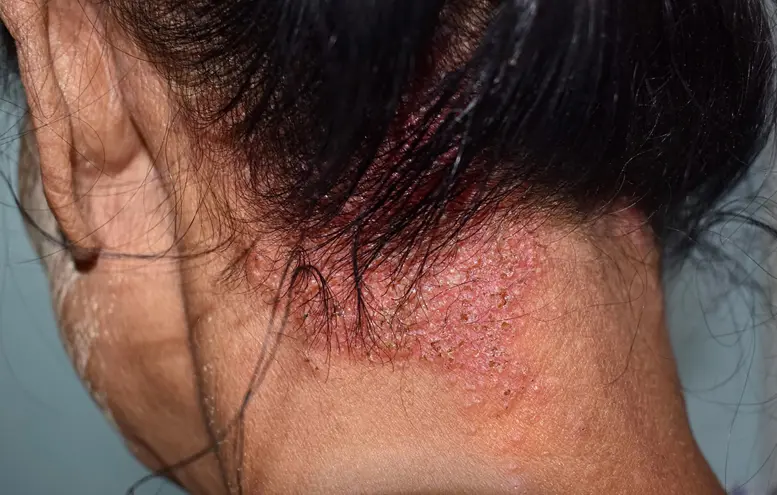Skin Infections
- Home
- Skin Infections
Our Doctor

Dr. Rahul Sheshgiri
Dermatologist & Cosmetic Doctor
Skin Infections

Introduction
Skin infections are a common concern that can affect individuals of all ages and backgrounds. From minor irritations like acne to more serious conditions like cellulitis and impetigo, skin infections can cause discomfort, pain, and embarrassment for those affected. In this comprehensive guide, we delve into the world of skin infections, exploring their causes, symptoms, and treatment options to provide valuable information for individuals seeking to understand and manage these conditions effectively.
Common Types of Skin Infections
Acne: Acne is a common skin condition characterized by the presence of pimples, blackheads, whiteheads, and inflamed lesions on the face, chest, back, and shoulders. It is caused by blockages in the hair follicles, excess oil production, and bacterial overgrowth, often exacerbated by hormonal changes, stress, and certain medications.
Impetigo: Impetigo is a highly contagious bacterial skin infection characterized by red sores or blisters that rupture and form honey-colored crusts. It is caused by Staphylococcus aureus or Streptococcus pyogenes bacteria and commonly affects children, particularly those in close contact settings such as schools and daycare centers.
Cellulitis: Cellulitis is a bacterial skin infection that affects the deeper layers of the skin and underlying tissue. It is characterized by redness, swelling, warmth, and tenderness in the affected area, often accompanied by fever and chills. Cellulitis can occur anywhere on the body but commonly affects the legs and feet.
Fungal Infections: Fungal infections of the skin, also known as dermatophytosis or tinea, are caused by fungi such as Trichophyton, Epidermophyton, and Microsporum species. Common fungal infections include athlete’s foot (tinea pedis), jock itch (tinea cruris), and ringworm (tinea corporis), which can cause itching, redness, and scaling of the affected skin.
Viral Infections: Viral skin infections, such as herpes simplex virus (HSV), human papillomavirus (HPV), and molluscum contagiosum virus (MCV), can cause a variety of skin lesions, including cold sores, genital warts, and small flesh-colored bumps. These infections are highly contagious and may require antiviral medications or other treatments to manage symptoms and prevent transmission.
Causes of Skin Infections

Skin infections can have various causes, including:
Bacteria: Bacterial skin infections are often caused by Staphylococcus aureus or Streptococcus pyogenes bacteria, which can enter the skin through cuts, scrapes, or other breaks in the skin barrier.
Fungi: Fungal skin infections are caused by dermatophyte fungi that thrive in warm, moist environments such as sweaty shoes, communal showers, and swimming pools.
Viruses: Viral skin infections are caused by various viruses, including herpes simplex virus (HSV), human papillomavirus (HPV), and molluscum contagiosum virus (MCV), which can be transmitted through direct contact with infected individuals or contaminated objects.
Parasites: Parasitic skin infections, such as scabies and lice infestations, are caused by parasites that burrow into the skin or attach to the hair shafts, leading to itching, redness, and irritation.
Symptoms of Skin Infections
The symptoms of skin infections can vary depending on the type and severity of the infection but may include:
- Redness, swelling, and warmth in the affected area
- Pain, tenderness, or itching
- Blisters, pustules, or pus-filled lesions
- Crusting, scaling, or flaking of the skin
- Fever, chills, or fatigue (in severe cases)
- Enlarged lymph nodes near the site of infection
Effective Treatment Options for Skin Infections
Treatment for skin infections depends on the type and severity of the infection but may include:
Topical Antimicrobials: Topical antimicrobial creams, ointments, or lotions containing ingredients such as bacitracin, neomycin, mupirocin, or clotrimazole can help kill bacteria, fungi, or viruses and reduce inflammation in the affected area.
Oral Antibiotics: For bacterial skin infections such as cellulitis or impetigo, oral antibiotics may be prescribed to help clear the infection and prevent complications. It is essential to complete the full course of antibiotics as directed by a healthcare provider to ensure the infection is fully eradicated.
Antifungal Medications: Antifungal medications, such as terbinafine, clotrimazole, or miconazole, may be prescribed to treat fungal skin infections such as athlete’s foot, jock itch, or ringworm. These medications can be applied topically or taken orally, depending on the severity of the infection.
Antiviral Medications: Antiviral medications, such as acyclovir, valacyclovir, or famciclovir, may be prescribed to treat viral skin infections such as herpes simplex virus (HSV) or shingles. These medications can help reduce the severity and duration of symptoms and prevent recurrent outbreaks.
Symptomatic Relief: Over-the-counter treatments such as anti-itch creams, corticosteroid creams, or cool compresses can help relieve itching, pain, and discomfort associated with skin infections while the underlying infection is being treated.
Conclusion

Skin infections are common conditions that can cause discomfort, pain, and embarrassment for those affected. From bacterial and fungal infections to viral and parasitic infestations, skin infections can present in various forms and require appropriate treatment to resolve. By understanding the causes, symptoms, and treatment options for skin infections, individuals can take proactive steps to manage their condition effectively and prevent complications. If you suspect you have a skin infection, consult a healthcare provider for evaluation and personalized treatment recommendations. With the right approach, skin infections can be effectively treated, allowing individuals to enjoy healthier, more comfortable skin.
What People Says!
Hear from our delighted clients as they share their experiences and stories of transformation. Your trust inspires us to keep delivering excellence!



